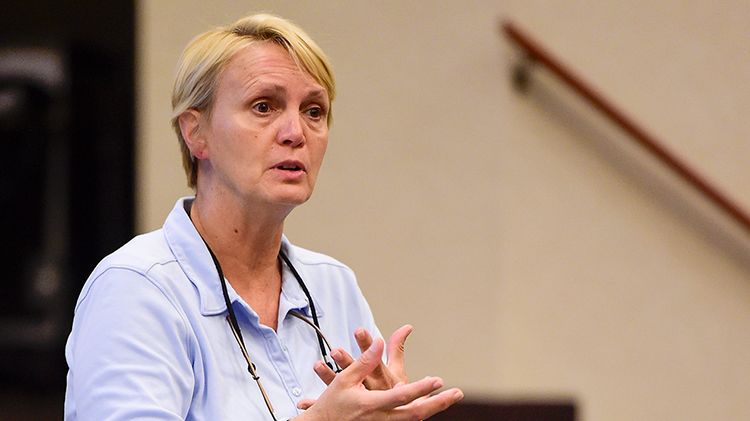
Jill Morgan, RN, the first nurse in the nation to care for the first patient treated in the U.S. with Ebola virus disease, standing in the PPE used at the SCDU.
Ten years ago, as the nation’s first patient with Ebola virus disease was transported to Emory University Hospital, charge nurse Jill Morgan, RN, was faced with a pivotal question: How? How could health care workers be certain of biocontainment? How could the risk of infection be mitigated, making the patient’s bedside as safe as possible?
“I never felt like I was exposed to Ebola,” says Morgan of her care for her first patient with Ebola virus disease, who arrived in serious condition after contracting the Zaire strain of the virus. The patient became infected while working at an aid organization in Liberia. Each patient faced a similar situation before they arrived at Emory.
“Our patients who contracted Ebola virus disease were all health care workers themselves traveling in Africa and none of them knew exactly how they had gotten exposed. They trusted their protocols and processes, too. How do we know that we stayed safe because of what we did, instead of being lucky? That's when I decided that trust is not enough. I want to see the evidence,” adds Morgan, site manager of the Serious Communicable Diseases Unit (SCDU) at Emory University Hospital.
Morgan’s care of these patients compelled her to conceive the idea for Emory’s first Healthcare Test Kitchen Lab, designed to validate bedside materials, procedures and protocols to ensure pathogen containment and maximum safety for employees, patients and their families.
Now in operation for a little more than a month, validation in the Healthcare Test Kitchen Lab occurs through simulations where items such as Personal Protective Equipment (PPE) and medical devices are contaminated with bacteriophages, which are harmless to humans but spread in a virus-like manner. Lab researchers then observe where the bacteriophages travel within a clinical setting and apply this information to protocols regarding cleaning equipment, donning and doffing PPE, as well as basic and necessary habits, such as touching keyboards, faces and phones.
Research regarding the care of the first patients with Ebola virus disease led to testing and changes in the use of PPE, and Morgan aims to keep the momentum going through the Healthcare Test Kitchen Lab.
“After testing, we made changes. We added better coverage of our sleeves and respirator hood. We changed how and when we take off some of the pieces — because no matter what you wear, taking it off safely matters,” says Morgan. “The Healthcare Test Kitchen Lab allows us to continue this work, looking at everything from how well we clean equipment and remove it from isolation units, to whether our toilets might propel infectious particles, even with the lid down.”

Jill Morgan, RN, now manages Emory's first Healthcare Test Kitchen Lab.
“While our first project will help us validate the biocontainment unit disinfection processes, we will also examine other methods of infection mitigation,” says Morgan.
Future experiments will focus on sanitation related to nail length and polish type; inadvertent bedside contamination from visitors or staff; and covered versus uncovered flushing in patient restrooms. “By understanding those topics, we can help reduce the infection risk to patients and ourselves, regardless of the pathogen type,” adds Morgan.
Colleen Kraft, MD, in Emory’s Departments of Pathology and Medicine, and Division of Infectious Diseases, is eager to share this knowledge in the health care community. “It’s rare that in a health care setting, we care for patients suffering from a pathogen that’s of mortal risk to ourselves. So many of us, after the experience with Ebola, felt that we didn’t want to waste that highly-reliable knowledge we had acquired,” says Kraft, who also served as one of the physicians that cared for the four patients with Ebola virus disease in 2014 at Emory.
In addition to Morgan and Kraft, Emory University's School of Nursing alumni Crystal Johnson, Laura Mitchell-Spurlock and Jason Slabach volunteered to care for these first patients, earning them the Emory Medal — the university's highest alumni honor — for their lifesaving work.
“We want to understand where health care workers and patients are at risk from infectious pathogens and how we can mitigate those risks,” says Morgan, “because what doesn't end up on our clothing or skin, doesn't move to the next patient, other staff or home to our families. And that matters, whether you are taking care of the next patient with Ebola virus disease or the next patient with bird flu, C. difficile or anything else.”
